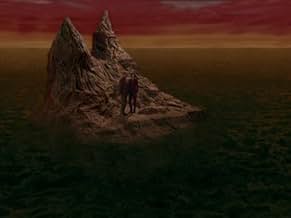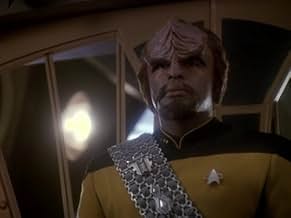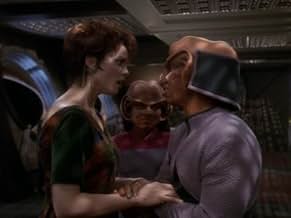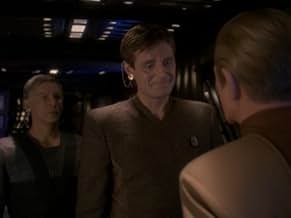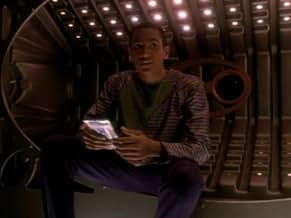बजोर के मुक्त ग्रह के आसपास के क्षेत्र में, फ़ेडरेशन स्पेस स्टेशन डीप स्पेस नाइन, आकाशगंगा के एक स्थिर वॉर्महोल के द्वार की रक्षा करते हैं.बजोर के मुक्त ग्रह के आसपास के क्षेत्र में, फ़ेडरेशन स्पेस स्टेशन डीप स्पेस नाइन, आकाशगंगा के एक स्थिर वॉर्महोल के द्वार की रक्षा करते हैं.बजोर के मुक्त ग्रह के आसपास के क्षेत्र में, फ़ेडरेशन स्पेस स्टेशन डीप स्पेस नाइन, आकाशगंगा के एक स्थिर वॉर्महोल के द्वार की रक्षा करते हैं.
- 4 प्राइमटाइम एमी जीते
- 59 जीत और कुल 116 नामांकन
एपिसोड ब्राउज़ करें
फ़ीचर्ड समीक्षाएं
I'm 21 years old, not many of my friends watch star trek, as a matter of fact, I don't know anyone in my age group who watches star trek, too uncool for them. I'm almost ashame to say that voyager was my first love. first because of 7 of 9, she was the sexiest thing i've ever seen.
But just out of curiosity I downloaded "Emissary" and "What you leave behind". I did the same for TNG, I downloaded "Encounter at Farpoint Station" and "All good things." Needless to say, I was most impressed with DS9. It was so real, well written and well acted.I downloaded as much episodes as i could find online. but I could only find about 50. Damn! so...
I had no choice but to get the whole 7 season DVD collection. It was so expensive too. I think it's the most expensive DVD set series out there. Anyway It was a good investment. The episodes were so good. I watch them over and over. each time i see something new in the episodes and I appreciate it more.
A part of me was wishing they would make a movie out of DS9 but after seeing what they did with TNG and nemesis..no way. Leave DS9 as it is. It's a thing of beauty. I only wished more people my age would give it a try. I mean i "loved" janeway,I thought she was great and the episodes were great but after seeing just a few episodes of DS9 i know it's the best and Dax is my girl...both of them. I love Kira too and Sisko(yea yea i know he's not as "charismatic" as picard but you know what, he's firm, direct and real. DS9 Pour Toujours
But just out of curiosity I downloaded "Emissary" and "What you leave behind". I did the same for TNG, I downloaded "Encounter at Farpoint Station" and "All good things." Needless to say, I was most impressed with DS9. It was so real, well written and well acted.I downloaded as much episodes as i could find online. but I could only find about 50. Damn! so...
I had no choice but to get the whole 7 season DVD collection. It was so expensive too. I think it's the most expensive DVD set series out there. Anyway It was a good investment. The episodes were so good. I watch them over and over. each time i see something new in the episodes and I appreciate it more.
A part of me was wishing they would make a movie out of DS9 but after seeing what they did with TNG and nemesis..no way. Leave DS9 as it is. It's a thing of beauty. I only wished more people my age would give it a try. I mean i "loved" janeway,I thought she was great and the episodes were great but after seeing just a few episodes of DS9 i know it's the best and Dax is my girl...both of them. I love Kira too and Sisko(yea yea i know he's not as "charismatic" as picard but you know what, he's firm, direct and real. DS9 Pour Toujours
DS9 is more character-focused and has longer story arcs than any Star Trek series before it (and after it until Disco). Unlike Disco, which is sheer melodrama, DS9 manages to simultaneously be fun and challenge viewers with dark and thought-provoking content. It's a difficult balance to achieve, and the writing team deserves kudos.
The interactions between Odo and Quark, Bashir and Garak, and Sisko and Dax are the biggest highlights. Dukat is one of the greatest Star Trek antagonists ever, and is played masterfully by Marc Alaimo. All of the characters feel like real people, including the Bajorans, who are immensely frustrating with their religious doctrine and political pursuits.
Unlike other Trek series, it's hard to think of standout episodes of DS9 (except maybe "The Visitor"), but the series as a whole is very well done.
The interactions between Odo and Quark, Bashir and Garak, and Sisko and Dax are the biggest highlights. Dukat is one of the greatest Star Trek antagonists ever, and is played masterfully by Marc Alaimo. All of the characters feel like real people, including the Bajorans, who are immensely frustrating with their religious doctrine and political pursuits.
Unlike other Trek series, it's hard to think of standout episodes of DS9 (except maybe "The Visitor"), but the series as a whole is very well done.
This is easily the best of all the Star Trek series. The characters are likable, and develop well over time. Of course it helps that many of the characters are warm and funny and very well fleshed out. Quark is a favourite of mine, always funny and well acted. The story itself is great, and really picks up in season 4. Having a plot that develops throughout rather than just stand-alone stories like many of the Next Generation episodes helps it a lot. The Religion v Science aspects are an interesting addition to a science-fiction show. Ideas created in TNG are carried forward and developed, such as the Trills, while in TNG they simply move their personality to a new body in this the idea is taken further and the personalities are merged, making the race much more interesting. One of the great aspects of the show is the relationships between the characters. O'Brian and Julian seem like genuine friends, Odo and Quark and their rivalry, and the on going feud of Sisko and Gul Dukat, the two commanders of the Station. The series created some genuinely good characters. Sisko, the Federation Officer torn between duty and destiny. Garak, the traitor with decidedly dark past, and Gul Dukat, a truly great villain. The series succeeds with a grand plot, paints a wider picture of the Star Trek Universe, and would make for some great feature films.
10gabe-129
I will say it started off kinda strange. most star trek series is spent having adventures on a star ship. This series for the most part stays on Deep space nine. Although there is still plenty of adventure. The thing that really makes this show so good is its large cast. It has many reoccurring secondary characters that help the the space station seem like a fascinating place for the show to take place. This story is much darker and more thought provoking than the other series. This series has so many things going for it.
Characters actually grow and change realistically and has reoccurring villains that have real depth and you never know quite what they are going to do. kai Winn and gul dukat both grow and change from series beginning to end and are the best villains ever.
This show has depth. It not all simple good guy and bad guy. There are complex motives behind many of the bad guys. Even the federation does some very bad things when they are in dire situations. People really have to live with the choices they have made. Problems from one episode don't just end with the episode like with TNG or the OS. you have to watch this from episode 1 to the end in order.
This show is still very relevant today. Terrorism, genocide, martial law are all seen in this series.
Characters actually grow and change realistically and has reoccurring villains that have real depth and you never know quite what they are going to do. kai Winn and gul dukat both grow and change from series beginning to end and are the best villains ever.
This show has depth. It not all simple good guy and bad guy. There are complex motives behind many of the bad guys. Even the federation does some very bad things when they are in dire situations. People really have to live with the choices they have made. Problems from one episode don't just end with the episode like with TNG or the OS. you have to watch this from episode 1 to the end in order.
This show is still very relevant today. Terrorism, genocide, martial law are all seen in this series.
Been watching the franchise series' in reverse order from a modern day standpoint comparison. Initially felt some of the characters in DS9 were a little irritating as some others have thought, but as it progressed through the series' I was found the character development to reverse my initial thoughts thankfully. Quark as a character is an example of this.
As like many others in the Star Trek, some of the storylines are derivative or overlapping of series. (no show is perfect) This is to be expected from a large number of episodes per season. Luckily there was a continuing narratives throughout to keep one engaged. The inclusion of the USS Defiant starship added another layer of interest, familiarity and diversity to plotlines.
On the whole, the premise of the series being based on a space station adds much-needed interest to an otherwise Starship-based franchises. The Next Generation, Voyager and Enterprise all share this narrative to varying degrees of success.
Onto re-watching The Next Generation after this. "Shut up, Wesley!"
As like many others in the Star Trek, some of the storylines are derivative or overlapping of series. (no show is perfect) This is to be expected from a large number of episodes per season. Luckily there was a continuing narratives throughout to keep one engaged. The inclusion of the USS Defiant starship added another layer of interest, familiarity and diversity to plotlines.
On the whole, the premise of the series being based on a space station adds much-needed interest to an otherwise Starship-based franchises. The Next Generation, Voyager and Enterprise all share this narrative to varying degrees of success.
Onto re-watching The Next Generation after this. "Shut up, Wesley!"
Stellar Photos From the "Star Trek" TV Universe
Stellar Photos From the "Star Trek" TV Universe
We've rounded up some of our favorite photos from across the "Star Trek" TV universe. Take a look at memorable moments from red carpet premieres and classic episodes.
क्या आपको पता है
- ट्रिवियाKira was a last-minute addition to the cast. The original plan was to include the Star Trek: The Next Generation (1987) character of Ro Laren, but Michelle Forbes didn't want to do a series at the time.
- गूफ़In the first three seasons, CDR Sisko refers to his father in the past tense, even talking about his slow demise and death from some unknown ailment. But starting in the fourth season ("Homefront"), Joseph Sisko is alive and well running a restaurant in New Orleans. Joseph appears in a total of six episodes throughout the last 4 seasons.
- क्रेज़ी क्रेडिटThe opening credits for "Emissary" lacked the wormhole opening that all future episodes featured. Starting with Season 4, the opening credits included additional spacecraft and activity around the station, including the Defiant flying into the wormhole.
- इसके अलावा अन्य वर्जनSeveral episodes were originally shown as 2-hour movies. They were later edited into two-part 60 minute episodes for later airings.
- कनेक्शनEdited into Star Trek: Voyager: Unity (1997)
- साउंडट्रैकStar Trek: Deep Space Nine - Main Title
Written by Dennis McCarthy
टॉप पसंद
रेटिंग देने के लिए साइन-इन करें और वैयक्तिकृत सुझावों के लिए वॉचलिस्ट करें
विवरण
- रिलीज़ की तारीख़
- कंट्री ऑफ़ ओरिजिन
- आधिकारिक साइटें
- भाषाएं
- इस रूप में भी जाना जाता है
- Deep Space Nine
- फ़िल्माने की जगहें
- उत्पादन कंपनी
- IMDbPro पर और कंपनी क्रेडिट देखें
इस पेज में योगदान दें
किसी बदलाव का सुझाव दें या अनुपलब्ध कॉन्टेंट जोड़ें



